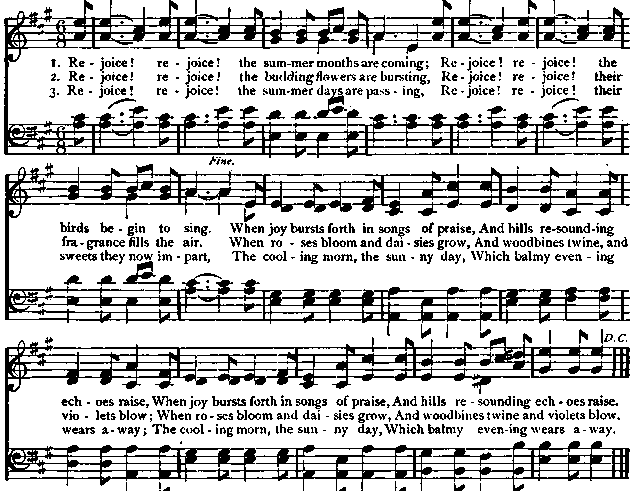Franklin Square Song Collection - online songbook
200 favorite songs and Hymns for Schools, Homes Lyrics & Sheet Music
| Share page | Visit Us On FB |
|
|
||||
|
* |
||||
|
12 |
FRANKLIN-SQUARE SONG COLLECTION. |
|||
|
Too Artistic.—The great mistake as to the singing in public worship is the desire to make it artistic. In Rome and Paris people rush to the churches to hear the singing; they care nothing for the other parts of the mass. Such is the case in many Protestant churches, where devotional singing has given way to the operatic. We have heard-of a church where the preaching is voted a bore, but where the fashionable resort to hear sacred songs sung by professional singers from the opera ; where the singing costs more than the preaching. How much better is it to go to such churches, where the praying and preaching are mere accompaniments to the singing, than going to the opera ? The truth is, that we sacrifice the devotional in the proportion that we cultivate the artistic beyond a given line. People that know |
not a note in music, can sing the praises of God so as to excite their devotional feelings, if the tune is a familiar one. And these form the great majority of ordinary congregations; and it is in reference to these, and not for the few cultivated ears, that the singing of congregations should be conducted. We heard the choir of the Sistine Chapel, and of St. Peter's and of St. Paul's; but so far as devotion is concerned, their singing bore no comparison 10 that we have heard in Scotch churches, led by a precentor from a seat under the pulpit; or in a Methodist church, when the brethren had "a good time." The singing in which most of the people can unite, may not be the most tasteful and classical, but is the best for the people; it is the most devotional. It may grate upon the ears of young misses from boarding- |
|||
|
REJOICE, REJOICE. |
||||
|
|
||||
 |
||||
|
schools, and of young gentlemen of operatic tastes; but because it elevates the religious feelings of the people, it is harmony in the ear of heaven. When even soldiers are led to the deadly breach, it is always under the inspiriting influence of words and tunes in which battalions may unite. If the " Marseillaise," as Lamartine says, was to Frenchmen as "a recovered echo from Thermopylae," why should not our Christian psalms and hymns be so sung as to be recovered echoes from Calvary? As singing is the part of public worship designed to unite all the people in concert it is a desecration of it to surrender it to a committee of artist musicians in the gallery.—Dr. Murray.
Strange as it may seem, if there were no creature that could hear upon the earth, there would be no such thing as sound, though all the movements in nature were going on just as they are now. Try to |
grasp this thoroughly, for it is difficult at first to make people believe it. Suppose you were stone-deaf, there would be no such thing as sound to you. A heavy hammer falling on an anvil would indeed shake the air violently, but since this air when it reached your ear would find a useless instrument, it could not play upon it. And it is this play on the drum of your ear and the nerves within it speaking to your brain which makes sound. Therefore, if all creatures on or around the earth were without ears or nerves of hearing, there would be no instruments on which to play, and consequently there would be no such thing as sound. This proves that two things are needed in order that we may hear. First, the outside movement which plays on our hearing instrument; and secondly, the hearing instrument itself, of whose structure few people know anything whatever. |
|||